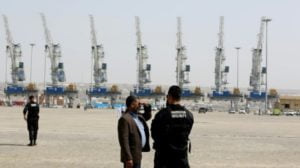Iran looks to remote port to beat US sanctions
Iran looks to remote port to beat US sanctions
With the web of US sanctions tightening, Iran faces a host of challenges as it looks to an isolated port in the country’s far southeast to maintain the flow of goods.

The port in Chabahar, only about 100 kilometres (62 miles) from the Pakistan border and located on the Indian Ocean, is Iran‘s largest outside the Gulf.
It is also the only Iranian port with exemptions from unilateral economic sanctions reimposed by the United States in 2018.
That is due mainly to the pivotal role of the port, and a planned railway line, in breaking landlocked Afghanistan‘s dependence on Pakistan for trade with the world, especially India.
Afghan trade, as well as plans for a trading route by rail between central Asia and the Indian Ocean called the North-South Corridor, are the main reasons the Islamic republic has invested one billion dollars in Chabahar’s Shahid Beheshti port, official sources say.
“We will keep on developing this port… our rail network, road network and airport are all being developed, so that we can implement the North-South Corridor,” Roads and Urban Development Minister Mohammad Eslami told AFP while visiting Chabahar for a development conference.
– ‘Traffic will pick up’ –
More than 200 hectares (almost 500 acres) of land have been reclaimed from the sea for the project and over 17.5 million cubic metres (618 million cubic feet) dredged, creating a 16.5-metre (54-foot) draught.
But more than a year since the new installations became operational in December 2017, business has yet to pick up.
The ships that officials say have docked in the past year have only loaded and unloaded 2.1 million tonnes of cargo, a far cry from the port’s annual capacity of 8.5 million tonnes.
Only 20 ships have docked at the new section of the port and most of its three kilometres of waterfront remains unutilised, with new machinery and neatly lined-up cranes standing idle.
—
Read More: France 24
Iran Briefing | News Press Focus on Human Rights Violation by IRGC, Iran Human Rights

